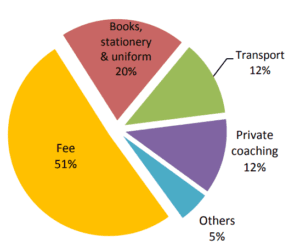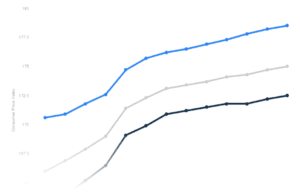Explore Courses
Top University

Aayushi
14 October, 2023
Table of Contents
Have you ever tried asking your parents how much money they have spent on your education till now? Or how they even managed to send you to College? If not, then do not even bother asking. You won’t be able to digest the cost of education you will have to bear to send your kids to college.
Four years ago, if you wanted to graduate in Journalism and Mass Communication from a reputed private college, after receiving the minimum scholarship amount, your semester fee would have been around INR 42,000. Today, even if you get a maximum scholarship, the semester fee for the same course is Rs. 72,000 per semester. I haven’t included the exam fee, hostel cost and other expenses till now. Now, If you time travel to the ’90s era, you will be crying your heart out because the amount they used to spend on education is what we spend on junk food in a college canteen today.
According to an article published by the Financial Express, in rural areas, over 70% of Indians are not able to complete their 10th-class education and 40% of individuals in rural India forget about further education. And it is not just in India, the cost of education has increased globally. Between 1980 and 2020, the average tuition fee, student accommodation cost and other expenses for an undergraduate degree have increased by 169%, as per the report by the Georgetown University Center on Education and Welfare.

Chart: Components of Expenditure on Education by CARE Ratings (2019)
A couple in my society has two children; one of their sons is in the 2nd year of his BTech, and the other is in the final year of MBBS. These are the most commonly chosen fields in India, and the couple shared that they have spent approximately 50 lakhs on their son pursuing MBBS and around 5 lakhs on their younger son so far. Considering the fact that India has more middle-class people, do you think everyone can afford such expenses? You may ask that fees for these courses have always been high, and yes, you will be right to say this. But even a general undergraduate course like BA, BSc, or BBA costs around 5 to 10 lakh. This number only includes the tuition fee, apart from this there are numerous other expenses such as books, travel, hostel fee and many others. Though in government colleges/universities, the number will be a little less, not everyone gets to secure a seat in good government institutions.
As per the data cited by The Hindu Business Line, the National Sample Survey showed an increase in the cost of primary education by 30.7% between 2014 and 2018. The fee structure for graduate courses increased by 5.8% and 13.19% for post-graduate courses in the same year. According to the data from the Unified District Information System for Education, about 39% of students belonging to the age group 20-24 drop out of college to assist their families in increasing household income.
Based on the survey conducted by the National Statistical Office (NSO) in 2017-2018, studying IT or computer-related courses would have cost INR 58,928, and the cost of management education was INR 58,555.

Chart by CARE Ratings
Following the numbers shown in the data survey by Statista, the cost of professional education in 2018 on average was INR 50,000 per year across India. On the contrary, the past years have seen a significant rise in the cost of general and professional education.

Post the second wave of the pandemic, there was a sharp dip in education inflation. Until April 2021, the inflation rate was 0.63%, but a year later, it rose to 4.12%. Since then, the cost of education has been rising slowly. According to an article by The Hindu Business Line, experts predict that inflation in the education sector may go up in the coming years owing to various interconnected reasons.
In fact, a recent study by BankBazaar also shows that schools and colleges have been witnessing inflation of 11 to 12% compared to overall Cost Price Index (CPI) inflation of 6%. Until March 2023, the Consumer Price Index throughout India was 175, implying a 75% increase since 2012.

Chart: CPI of education across rural and urban India (2022-2023)
It is nerve-wracking to see college education getting so expensive each year, especially at times when the employment rate of the country is also struggling to breathe. So, is there any way to make college education a bit more affordable?
No matter which field you want to work in, with the right approach and planning, you can at least ensure that you don’t pay more for tuition. Start by calculating how much you will spend in college and if it can be reduced by any financial aid. Scholarships and financial aid schemes of colleges/universities are the most well-defined methods to make your education affordable, even at a premier institution. Another approach you can adopt is to choose a public or government-funded institution. As you may already know, public institutions’ tuition fees are less expensive than private colleges.
It is said that you should not create a liability; instead, focus on building assets that will give you good returns in the future. Similarly, when you are choosing any programme, try to pursue a course that will help you develop skills relevant to the current industry trends and, thus, find lucrative job opportunities. That is how you can get the best return on investment in education. The money you will spend on your education can easily be retrieved within 4-5 years of your employment, provided that you choose the right course.
High expenses of a college education are one of the key areas where the Indian education system needs improvement. In 2022, the Indian Government took the initiative in this regard and fixed a minimum and maximum fee for engineering and management courses as per the recommendations of AICTE. Now, it depends on the state governments to revise the fee structure as per their policies.
In addition to this, governments can start new entities that provide education loans at a cheaper interest or offer longer repayment tenures. Although education loan facilities are provided by several institutions in India, the process and criteria can be made more accessible.
Meanwhile, from our end, we should start planning our finances accordingly so as to accumulate enough for your kid’s college education. Or you can go for a distance/online programme, which is a more cost-efficient way to have a good academic experience and benefit from its flexible format by working simultaneously.
Our team of experts, or experienced individuals, will answer it over online meet. Book your slot now!
Book Free Online CounsellingGet Free Career Guidance
